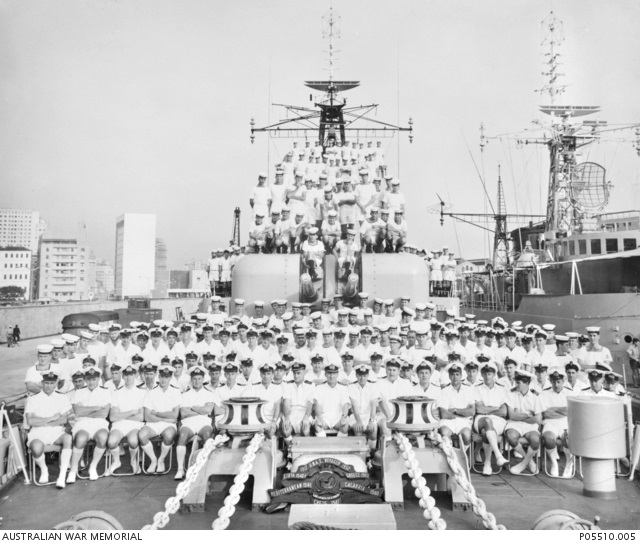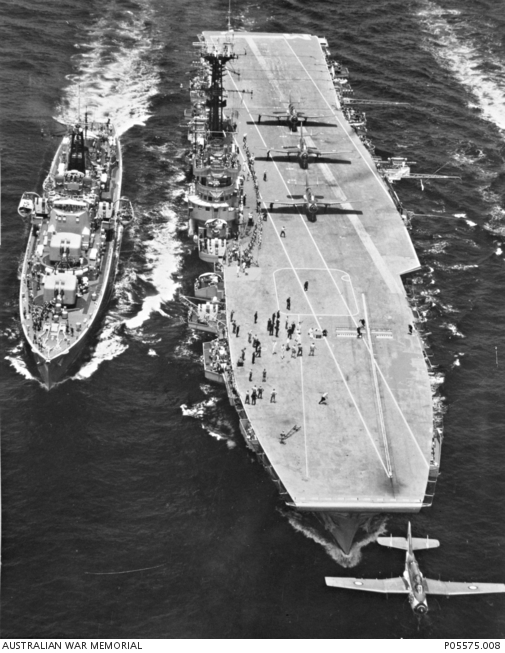
Tomorrow marks the 60th anniversary of the loss of the Royal Australian Navy destroyer, HMAS Voyager (II), which sank 20 nautical miles south-east of Jervis Bay. Of the 314 crew of Voyager, 82 were lost that night in Australia’s worst peacetime military disaster. Many more lives were altered forever. We are a maritime nation and yet our maritime history is often forgotten. We must remember the loss of Voyager on the night of Saturday 10 February, 1964.
The destroyer was escorting HMAS Melbourne (II), Australia’s last aircraft carrier, as it carried out flying operations. Both ships had recently emerged from refits. Voyager was the ‘plane guard’, positioned 1000-2000 yards off Melbourne’s port quarter to recover the crew of any aircraft that might ditch.
Following a series of manoeuvres, Voyager ended up out of position on Melbourne’s starboard bow and was required to resume her station. How and why Voyager ended up in this position remains unclear 60 years on although there are many theories. In truth, we will never know as most of the bridge team were lost that night.
Presumably attempting to resume her station, Voyager was seen to alter to starboard away from the carrier, and then back to port towards it. The 3,600 tonne Voyager crossed the bow of the 20,000 tonne Melbourne. There was little time to react and despite attempts to avoid the collision in the final seconds, the two ships collided at 20:56. Melbourne’s bow struck Voyager aft of her bridge, severing the ship. Voyager’s bow passed down the port side of Melbourne, sinking within 10 minutes of the collision. A recovery operation was immediately launched by Melbourne, which was joined by several vessels from HMAS Creswell, in Jervis Bay.

Many stories of heroism emerged from the hellish night. Midshipman Kerry Francis Marien survived the collision but left the relative safety of his life raft and was last seen swimming towards the rapidly sinking bow of Voyager to search for survivors struggling in the water.
Chief Petty Officer Jonathan ‘Buck’ Rogers was trapped in the forward section of the bow. Realising he was too big to get through the small escape hatches, Buck took charge of trying to help the 50 sailors trapped with him to escape. And when escape was no longer possible, he was heard leading those trapped there in prayers and hymns. There are many stories of heroism from that night, of the brave men of the Royal Australian Navy rising to the occasion to save the lives of shipmates and friends. Stories that we know, and stories we will never know.
In the years that followed the loss of Voyager, the national conversation was dominated by the controversy. The incident was followed by two royal commissions and many theories and books on how and why such a horrific peacetime loss of life could occur. It is of course important to understand why Voyager was lost and where accountability lies. Whilst we should never lose sight of the many hard lessons learnt, on the 60th anniversary we should focus our thoughts on the brave sailors who died and those who survived but whose lives were never the same.
The sea is a perilous place, it does not recognise a distinction between wartime and peacetime. Every time our naval ships set sail, they put themselves at the mercy of this unforgiving environment. For centuries the oceans have rallied against those who seek to tame it, and operating in this environment will always be dangerous. Preparation in this domain for the possibility of conflict requires the women and men of our Navy to practise the operations and procedures that they will rely on in wartime. There is always risk, and they embrace it daily.
When we think of our military heroes we talk of those on the Kokoda track and the trials of Gallipoli and the Western front. They all rightfully deserve a place in the collective memory of our nation and remind us of what war really means, especially in this time of global tensions that permeate all aspects of international and national security.
On the anniversary of the Voyager’s loss we must also remember the brave men lost in peacetime as they trained to defend their country. They too are our heroes, and they died in the service of our nation.

